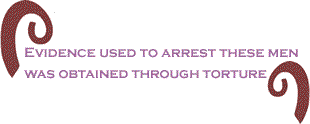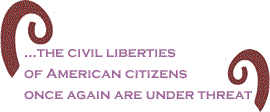
|
|||||||||||||||||||||
 |
|||||||||||||||||||||
 |
|||||||||||||||||||||
 |
|||||||||||||||||||||
 |
|
The recent arrest of
eight former Black Panthers for the 1971 murder of a On January 23, Sensationalistic news stories— depicting menacing Black urban terrorists who are finally brought to justice— make for eye-catching headlines. The legacy of government misconduct which brings us to this story, however, is far more profound and far more disturbing. Evidence used to arrest these men was obtained
through torture. In
1973, And electric probes were placed on their genitals. In 1974 a court ruled that the Every first-year law student learns about the doctrine of "the fruit of the poisonous tree". Evidence obtained by illegal means such as torture, in violation of a person's constitutional rights, cannot be considered by a judge or jury. Such evidence is not trustworthy. It taints the proceedings with an air of misconduct and corruption, and a court cannot use it. And through torture, a person is likely to say anything in order to end the infliction of pain. Under torture, the most upstanding citizen will confess to criminal behavior he or she did not commit, or accuse others of conduct not of their making. And the innocent will admit to engaging in terrorist acts that were the handiwork of another, or acts that exist only in the imagination of the interrogator.
"The case against these men was built on torture and serves to remind us that the U.S. government, which recently has engaged in such horrific forms of torture and abuse at places like Bagram, Abu Ghraib and Guantánamo, has a history of torture and abuse in this country as well, particularly against African Americans," says Bill Goodman, legal director of the Center for Constitutional Rights. Indeed, the recent arrests remind us of decades earlier, before the "War on Terror," when the FBI under J. Edgar Hoover waged a war on domestic groups in the 1960s and 1970s. Called COINTELPO (an acronym for counterintelligence program), among the goals of the program were to "disrupt and neutralize organizations which the Bureau characterized as Black Nationalist Hate Groups," and "prevent the rise of a messiah who could unify and electrify the militant nationalist movement," according to a 1976 report released by the Senate Select Committee to Study Governmental Operations with Respect to Intelligence Activities, also known as the "Church Committee" from the committee's chair Sen. Frank Church (D-Idaho). Some of the targets of the COINTELPRO program included Dr. Martin
Luther King, Jr. and his Southern Christian Leadership Conference
(SCLC), Malcolm X, the Student Nonviolent Coordinating Committee
(SNCC), and the Black Panther Party, described by A government-operated domestic spying program taking place during the height of the civil rights movement, in an effort to destroy that movement and its leaders, COINTELPRO remains a contemptible chapter in American history. "Many of the techniques used would be intolerable in a democratic society even if all of the targets had been involved in violent activity, but COINTELPRO went far beyond that," the Church Committee reported. "The unexpressed major premise of the programs was that a law enforcement agency has the duty to do whatever is necessary to combat perceived threats to the existing social and political order." FBI coordination with the So, it is under this troubled history that these ex-Black Panthers are once again in the spotlight. The FBI's war against civil rights groups has given way to the war on terror, and the civil liberties of American citizens once again are under threat.
"People ask the question, why pick up these men after they've been around, have not attempted to elude the authorities, have led productive lives all these years?" says Michael Warren, attorney for Francisco Torres. "The reason why is simply this: … John Ashcroft, shortly after he was appointed the Attorney General, made a vow and a promise that he was going to go after as many ex-Black Panthers as he possibly could. And that's when this program was instituted." Warren adds: "The most recent reason, it relates to retaliation. These men, after being tortured (in 1971), and after the grand jury ended in 2006, went on the road with the Center for Constitutional Rights and talked about their torture…. And that's what this case is about." Now, it seems, there are old scores to settle
with the Panthers, as old habits die hard. Sadly, America David A. Love is an attorney and writer based in Philadelphia who writes for the Progressive Media Project and McClatchy-Tribune News Service. |
|
| Home | |
| February 1, 2007 Issue 215 |
||||||||||||||
|
||||||||||||||
| Printer Friendly Version in resizeable plain text format | ||||||||||||||
 |
||||||||||||||
|
||||||||||||||
 |
||||||||||||||
 |
||||||||||||||
 |
||||||||||||||
 |
||||||||||||||
| |
||||||||||||||
| |
||||||||||||||






























